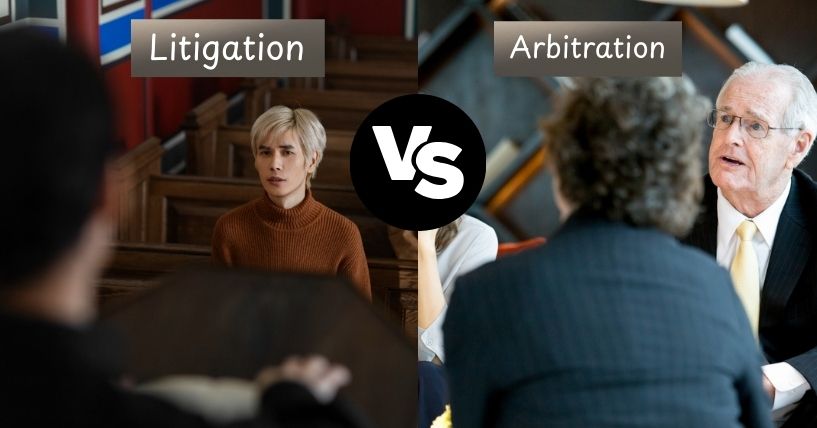
When it comes to settling commercial disputes, companies usually struggle between arbitration and litigation. Selecting the proper route can greatly influence the cost, duration, secrecy, and result of a dispute. In the litigation vs arbitration dilemma that continues to influence, knowing both options is critical prior to determining which is best for your case.
This blog presents the difference between arbitration and litigation in the context of Australian businesses to help you make a well-informed decision.
Litigation is the traditional process of resolving conflicts in the court of law. In Australia, commercial litigation may happen in state Supreme Courts or the Federal Court, depending on the quantity and subject matter.
Litigation is subject to public record. In most of the court hearings, verdicts are published to the general public.
In litigation, procedures are characterised by statutory provisions that include the Uniform Civil Procedure Rules and the Evidence Act 1995 (Cth).
The parties have a right of appeal to higher courts against orders made, and on certain orders, leave is sought.
A binding decision is made by a judge (in some cases, a jury in limited situations) after hearing evidence and legal arguments.
One form of alternative dispute resolution (ADR) is arbitration, where parties to a dispute present their case to one or more arbitrators to resolve, without having to go to court. It is commonly applied in business contracts, particularly those related to construction, intellectual property, and international trade deals.
The arbitral process is less open than litigation. This appeals to businesses (LLC vs corporation) hoping to maintain trade secrets or reputations.
Arbitration is based upon a contract or agreement, where the parties stipulate in advance (typically in an arbitration clause) that disputes will be resolved by arbitration.
The decisions of arbitrators (and awards of arbitrators) are final and binding and have extremely few avenues of appeal under the Commercial Arbitration Act 2012 (WA) and equivalent state legislation.
The parties have the choice of arbitrator(s), procedure rules, venue, and language to be used in the hearing.
Litigation may be preferable in the following cases:
Urgent injunctions or freezing orders (Mareva injunctions) are examples.
Arbitration is only possible if both parties consent to it.
Courts permit appeals on factual and legal grounds.
Litigation can create a legal precedent, which is valuable in emerging areas of law.
Also, where more than one party is concerned (particularly if not everyone has consented to arbitrate), litigation provides for combining all parties within one proceeding.
When it comes to arbitration, this is a better option in most cases.
Where sensitive matters are involved, like trade secrets, price disagreements, or intra-partnership or joint venture disputes.
Either of the parties that initiates an arbitration can choose an individual who is familiar with a particular field or industry in question, e.g., construction or technology disagreements.
Where parties would speed up proceedings.
Arbitration awards can be acknowledged in over 160 nations using the New York Convention, making arbitration a suitable alternative to cross-border types of commercial contracts.
Arbitration is also usually less confrontational than litigation, permitting the maintenance of existing commercial relationships.
Arbitration in Australia is regulated by:
Litigation is controlled by state and federal rules of civil procedure and general legislation like the Federal Court Act 1976 (Cth) and the Supreme Court Acts of the states.
Litigation can be capital-intensive, with extensive pleadings, discovery, and court hearings. Expenses can run out of control, particularly if the case reaches trial. In contrast, arbitration is more likely to be time and cost-effective, although this is largely dependent on cooperation by the parties and the nature of the issue.
But both forums are expensive if not properly controlled. Hiring commercial solicitors Perth in the process can assist in controlling costs and time, no matter what the forum.
The litigation vs arbitration argument is actually on what you want to get out of your commercial dispute in a particular case, the nature of the dispute, the nature of the relationship between the parties, and strategic considerations. Both litigation and arbitration have merits and demerits.
Having the knowledge of the difference between arbitration and litigation in Australia renders business people the authority to incorporate appropriate clauses on dispute resolution in contracts and to make wise decisions in case of disputes.
Commercial lawyers Perth WA team did a great job for my settlement. Very professional and friendly lawyers in Perth . My queries were always answered and were just a call away . Highly recommended commercial lawyers in Perth , Western Australia!
Commercial lawyers Perth team did a great job for my settlement. Very professional and friendly lawyers in Perth . My queries were always answered and were just a call away. Highly recommended commercial lawyers in Perth , Western Australia
Commercial Lawyers Perth WA did a great job for my settlement. Very professional and friendly lawyers in Perth. My queries were always answered and were just a call away. Highly recommended commercial lawyers in Perth, Western Australia